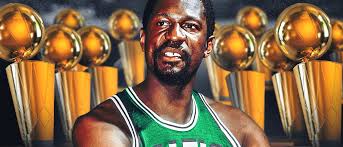When people talk about the greatest athletes in history, names like Michael Jordan, Serena Williams, and Tom Brady often dominate the conversation. Yet few have had a more profound impact on their sport and society than Bill Russell. With 11 NBA championships, unmatched leadership, and unwavering principles, Russell wasn’t just a basketball legend; he was a transformative figure who reshaped the game and stood tall in the face of adversity.
A Defensive Revolution in an Offensive World
Bill Russell entered the NBA in 1956 as a 6’10” center out of the University of San Francisco, where he had already won two NCAA titles and an Olympic gold medal. But his arrival in the professional game marked something much bigger. At a time when scoring was king and defense was secondary, Russell introduced a new philosophy: defense as dominance.
He wasn’t the most prolific scorer, averaging just 15.1 points per game over his career. But what he lacked in offense, he made up for in basketball IQ, positioning, and timing. Russell turned shot-blocking and rebounding into strategic weapons, anchoring a Boston Celtics dynasty that would go on to win 11 championships in 13 seasons a record still unmatched in professional sports.
More than the stats, it was the way Russell played that changed the game. He didn’t chase individual glory. He prioritized winning. His style emphasized team defense, fast-break offense, and unselfish play. He made it clear that greatness isn’t about how much you score it’s about how much you elevate everyone around you.
Leadership That Transcended the Court
What truly set Russell apart was his leadership. Whether it was motivating his teammates, mentoring younger players, or setting the emotional tone for the Celtics, Russell was the heart of a team that thrived under pressure.
In 1966, he became the first Black head coach in North American professional sports, when he took on the role of player-coach for the Celtics. He led the team to two more championships during his tenure, all while navigating the racial tensions of 1960s America. He didn’t just break barriers—he shattered them, all while staying true to himself.
Russell once said, “I don’t have very many regrets, but I will never forgive myself for not being strong enough to not let it bother me. It should have been a badge of honor, that people were threatened by me.” That quote speaks volumes about the kind of person he was—humble, introspective, and deeply principled.
A Legacy Rooted in Integrity
Bill Russell’s impact extended far beyond the hardwood. He marched alongside Dr. Martin Luther King Jr., supported Muhammad Ali when he refused the Vietnam draft, and spoke out against injustice when silence would have been easier. Despite being the face of a Celtics team that brought Boston endless championships, Russell often faced racism from the very city he helped uplift. His house was vandalized. He was denied service. He was called slurs by fans in his own arena.
Still, he never wavered.
Rather than perform for approval, Russell carried himself with quiet dignity. He didn’t demand applause; he demanded respect. And in time, the world came to see him not only as a basketball hero but as a symbol of strength, resilience, and moral clarity.
How He Changed the Game Forever
Bill Russell didn’t leave the game with flashy scoring records or endless endorsement deals. He left it with something far more valuable: a blueprint for greatness rooted in sacrifice, teamwork, and purpose.
Today, the NBA Finals MVP trophy is named in his honor—a fitting tribute to a man who made winning his legacy. Modern stars like Tim Duncan, Kevin Garnett, and Draymond Green have all acknowledged Russell’s influence on the role of the defensive big man and team-first leadership.
But even more importantly, athletes across all sports continue to look to Russell as a model of how to use your platform with purpose.
The Blueprint of a True Icon
Bill Russell wasn’t flashy, and he didn’t crave attention. But that’s exactly what made him iconic. He led by example, proved that defense is as valuable as offense, and stood tall in a time when being silent would have been safer. He redefined not only what it means to be a champion but what it means to be a leader.
In a world hungry for heroes, Bill Russell gave us something better: a man of substance who let his values not his stats define his legacy.

